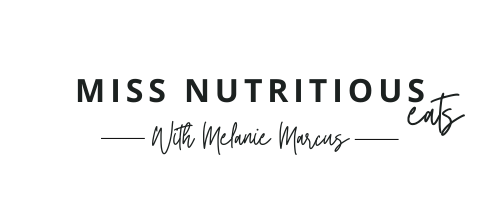20 healthy fats to help you meet your macros
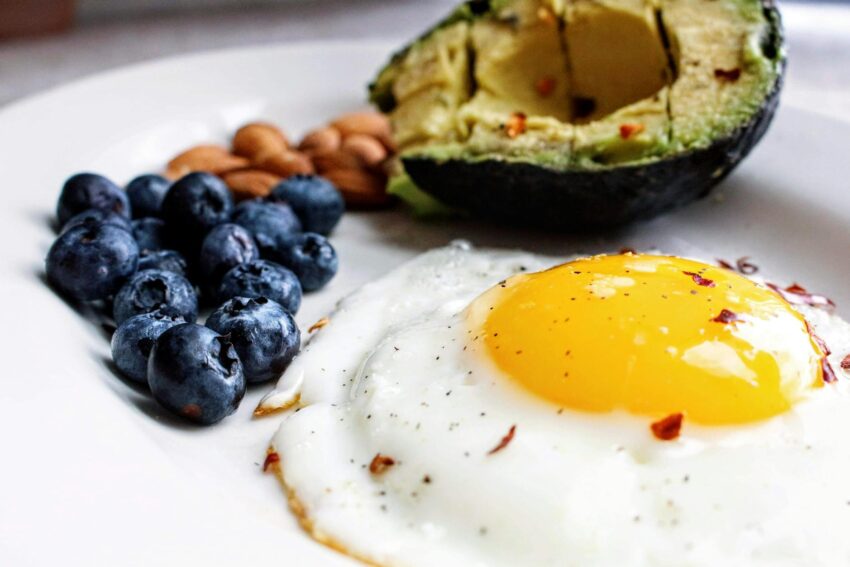
Meeting your macro goals can feel like walking a tightrope, especially when it comes to fat intake. While fats are often misunderstood, even wrongly villainized, they play an important role in a healthy diet. But not all fats are created equal. To truly benefit from dietary fat, you need to differentiate between healthy fats and those with negative impacts on overall health.
Table of contents
Why Are Healthy Fats An Essential Part of the Diet?
Healthy fats are found in foods like olive oil, fatty fish, and nuts, and they offer countless health benefits when consumed in moderation. Unlike trans fats or heavily processed hydrogenated oils, healthy fats support heart health, enhance cognitive function, and aid in the absorption of fat-soluble vitamins like A, D, E, and K.
Some benefits of dietary fat include:
Energy Source: One gram of fat offers 9 calories, making it a concentrated energy source to fuel your daily activities.
Satisfaction & Flavor: Every Chef knows, fat is flavor, and consuming it with each meal helps slow down digestion while providing satisfaction.
Brain Health: Fats like omega-3s support your brain, boosting cognitive function and memory.
Nutrient Absorption: Fat is necessary for nutrient absorption, particularly essential nutrients obtained from a balanced diet.
Hormonal Support: Healthy fats keep your hormones in check, including those essential for metabolism and stress regulation.
Heart Health: Healthy fats like monounsaturated fat and polyunsaturated fatty acids reduce bad cholesterol and support reduced risk of cardiovascular disease.
Studies, including those popularized by the Mediterranean diet, show that eating the healthiest fats, when included as part of your macro ratio, can aid in weight loss, muscle gain, and help maintain blood sugar levels. The key is balance and quality over quantity.
The Different Types of Fat
1. Monounsaturated Fats (The Best of the Best)
Monounsaturated fats are considered one of the healthiest fats and are a key pillar of a healthy diet. They’re heart-healthy, help regulate cholesterol levels, and may reduce the risk of heart disease.
Sources:
- Olive oil (rich in oleic acid)
- Avocados
- Nuts like almonds and cashews
2. Polyunsaturated Fats (Including Omega-3s and Omega-6s)
These are also in the “great fats” category. Omega-3s, in particular, are associated with improved heart health, reduced inflammation, and better brain health.
Sources:
- Fatty fish (e.g., salmon, mackerel)
- Chia seeds and flax seeds
- Certain vegetable oils, like sunflower and safflower oil
3. Saturated Fats (Moderation is Key)
Saturated fats get a bad rep because they’re often associated with red meat and processed animal products, but not all saturated fats are harmful. When from whole, minimally processed sources, they support hormone production and muscle mass. These fats are solid at room temperature.
Sources:
- Coconut oil
- Full-fat dairy (think yogurt, cheese)
4. Unhealthy Fats to Avoid (or Eat Sparingly)
Not all fats are your friend. Trans fats and processed saturated fats found in hydrogenated oil, fried foods, and commercial snacks can raise bad cholesterol, increase the risk of heart disease, and disrupt your overall health.
Avoid or Limit:
- White bread fried in unhealthy oils
- Packaged foods laden with hydrogenated oil
- Foods high in simple carbohydrates paired with high-fat ingredients
Fat Sources to include in your diet
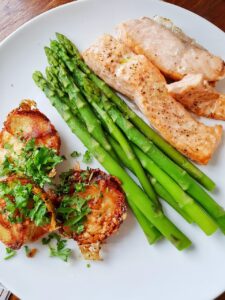
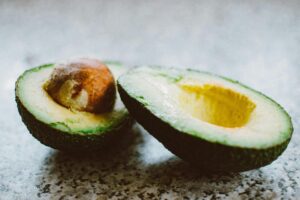
1. Salmon
- Benefits: Packed with omega-3 fatty acids, fatty fish like salmon and sardines improve heart health and reduce the risk of cardiovascular disease.
- 100g: 13g fat, ~20-25g protein
2. Avocados
- Benefits: Avocados are a rich source of monounsaturated fat, which benefits your cholesterol levels and keeps you fuller for longer—aiding in both weight loss and maintenance of a healthy weight.
- 100g: 15g fat, 2g protein
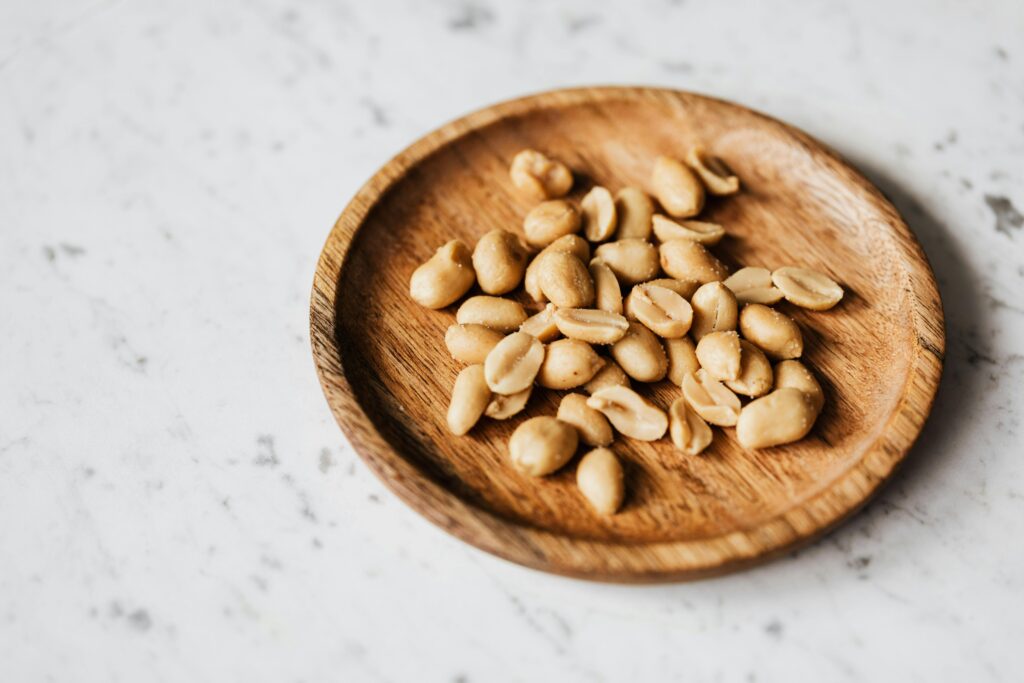

3. Nut Butter
- Benefits: Nut butters, like almond or peanut butter, are a good place to include satiating, delicious fats. They’re high in calories, so be mindful of your portion sizes!
- 2 tbsp: 16-18g fat, 6-8g protein
4. Olive Oil
- Benefits: A staple in the Mediterranean diet, olive oil is packed with oleic acid and antioxidants that improve heart health and reduce inflammation.
- 1 tbsp: 14g fat
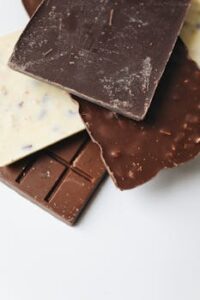
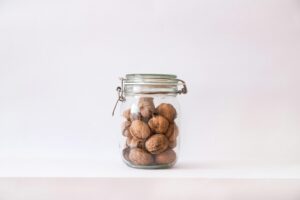

5. Dark Chocolate (80% or Higher)
- Benefits: Ah, the treat that’s also healthy! Dark chocolate contains antioxidants and a moderate dose of monounsaturated fats, making it a delight for your overall health.
- 30g: ~9-12g fat
6. Walnuts
- Walnuts are an awesome source of omega-3 and omega-6 fatty acids. Plus, they’re packed with the minerals manganese and copper. The average serving is about 14 halves.
- 1 oz: 19g fat, 4g protein
7. Almonds
- Nuts are generally full of healthy fat, and you really can’t go wrong with any type. But I’m a big fan of almonds—they pack in 14 grams of fat per 1-oz. serving (around 23 nuts) and are loaded with vitamin E!
- 1 oz: 14g fat, 6g protein
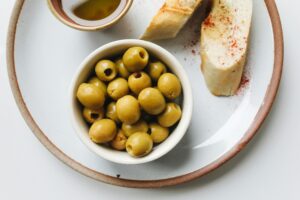
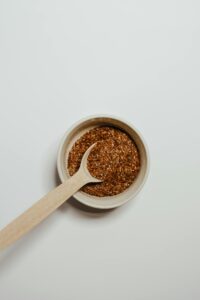
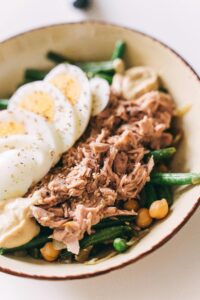
8. Olives
- Rich in fat and big on briney flavor, olives are all fat.
- 1oz: 4g fat
9. Flax Seed
- Flaxseed is awesome for getting those omega-3 fatty acids, with about 8 grams of fat per ounce. Plus, it’s got both insoluble and soluble fiber, which help you feel full, keep your digestion on track, stabilize blood sugar, and even keep your poops regular!
- 2 tbsp: 5g fat, 3g protein
10. Tuna
- Another fish that’s loaded with healthy fats and omega-3s. Whether it’s the budget-friendly canned version (around 5 grams per can) or the sushi-grade kind from your favorite Japanese place (about 5 grams in 3 ounces, cooked), tuna’s got you covered.
- 3 oz Bluefin Tuna: 4g fat, 20g protein
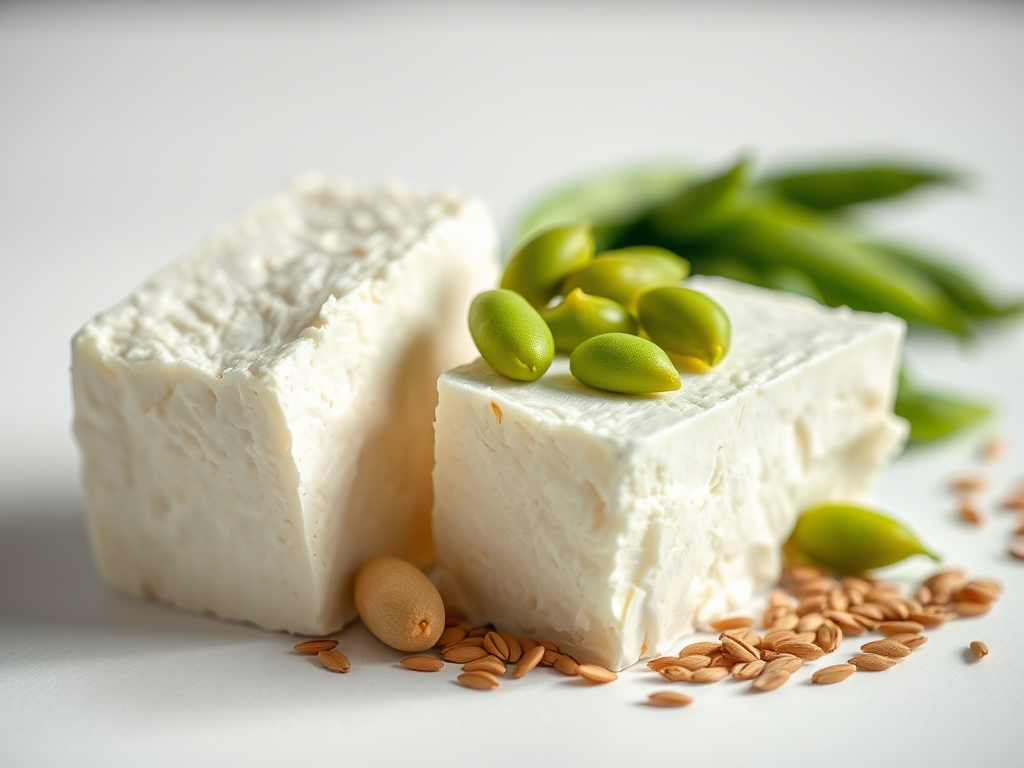
11. Tofu
- Tofu is a favorite for vegetarians and vegans because it’s a great source of healthy fats and plant-based protein. While tofu may not have as much fat as some other foods on this list, you still get around 4 grams of fat from a 3-oz. serving of super-firm tofu.
- 3 oz: 4g fat, 9g protein
12. Edamame
- Tofu is made from edamame, so I definitely can’t forget the plant it’s made from! Shelled edamame is not only a young soybean but also a fantastic source of fiber at 4 grams per serving.
- 1/2 cup: 4g fat, 9g protein
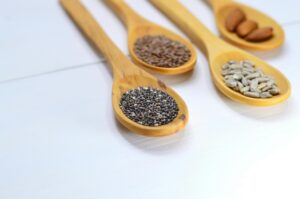
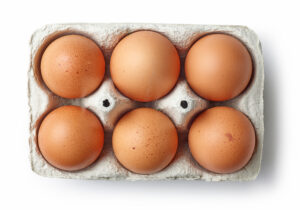
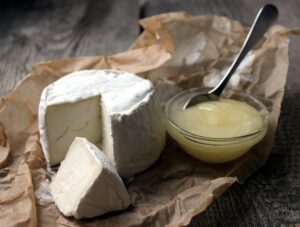
13. Sunflower seeds
- Flavorful, crunchy and easy to add to nearly any meal or snack.
- 2T: 14g fat, 6g protein
14. Chia Seeds
- These tiny seeds have a ton of fiber, protein, nutrients and fat!
- 2T: 6g fat
15. Eggs
- Eggs are my go to protein source. Breakfast for dinner anyone? They’re still affordable and if you keep the yolk, they’re also a great source of fat. An extra-large egg packs 6 grams of fat, but don’t skip the yolk! It adds delicious flavor and essential nutrients like selenium and choline. Plus, recent research reveals that egg yolks can fit into a healthy diet without significantly impacting cholesterol levels.
- 1 x-large egg: 7g protein, 5g fat
16.Full Fat Dairy
- Not everyone can tolerate dairy, which is why we eliminate it during the first six weeks of the FASTer Way. However, dairy provides satisfaction, flavor, and creaminess. In small amounts, it can be a powerful way to add flavor.
- 1 cup full-fat yogurt: 8g fat, 20g of protein
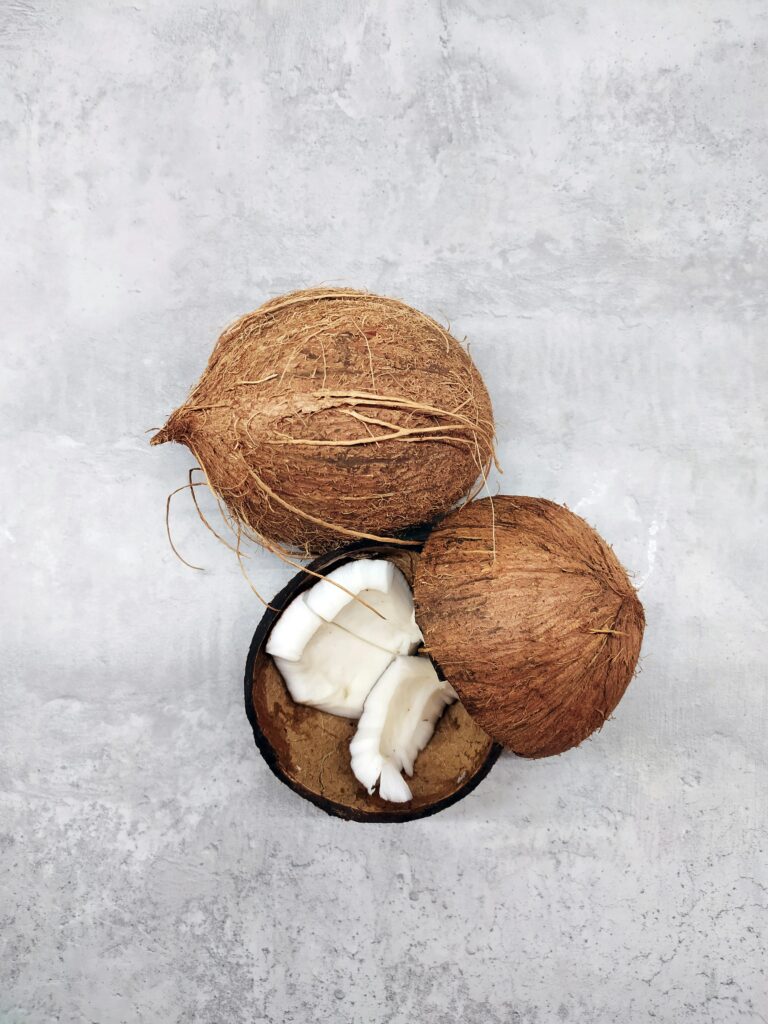
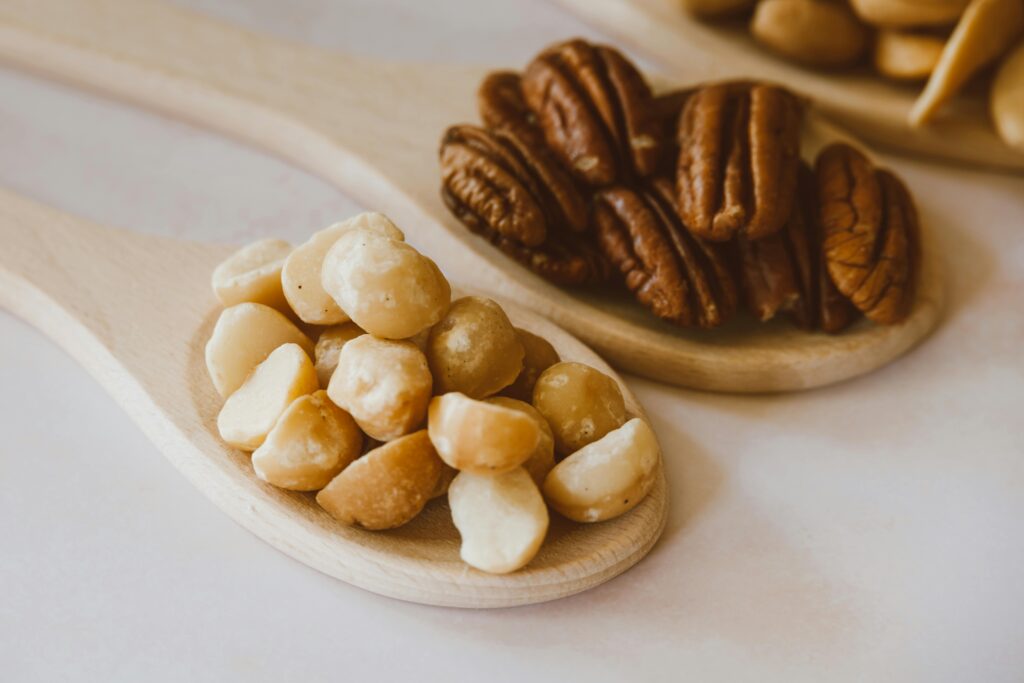
17. Hemp Seeds
- Hemp seeds are nutty in flavor and smooth in texture, packed with healthy fats perfect for any diet.
- 3T: 9g protein, 15g fat
18. Shredded coconut
- You’ll find coconut in nearly every form—milk, cream, water, oil, fresh meat, and dried flakes. Sweetened or unsweetened shredded coconut flakes have about 8 grams of fat per ounce, and a lot of tropical flavor. Just caution that coconut is a plant source of saturated fat which is generally avoided on a heart healthy diet.
- 1oz: 8g fat
19. Pumpkin Seeds
- Pumpkin seeds, or pepitas, are tiny powerhouses! They’re not just tasty but also packed with essential minerals like iron, magnesium, phosphorus, copper, and manganese.
- 1oz: 13g fat, 7g protein
20. Macadamia Nuts
- Prior to starting the FASTer Way, I mentally reserved macadamia nuts for an actual trip to Hawaii because of their high fat content. I placed them on that “indulgence” shelf and never considered them a real option. But now I enjoy them because I’m eating to fuel my workouts during low carb days.
- 1oz: 22g fat, 7g protein
Remember, your fat macro target depends on your total daily calories and activity level, so adjust according. If you’re not sure, work with your doctor or a registered dietitian to set up your target.
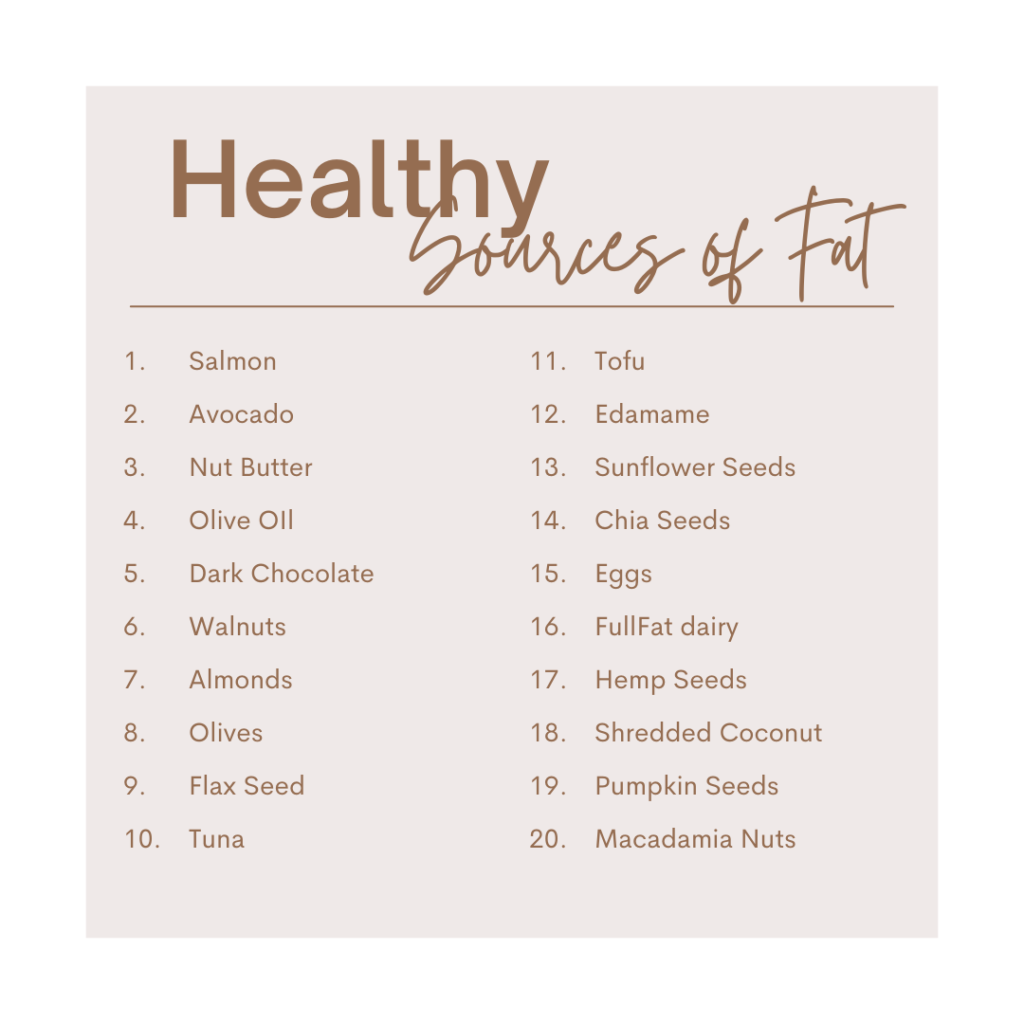
How Much Fat Should You Eat?
You might wonder, “How much fat is the right amount?” Most dietary guidelines recommend fat should make up 20-35% of your total calories—or roughly 0.5-1g per kilogram of body weight, depending on your goals and activity level. Strike the right balance of grams of fat, carbohydrate intake, and protein intake to ensure you’re working toward a balanced diet.
Join my next 6 week challenge!
Tired of endless diets and no results? Join the FASTer Way to Fat Loss and see real, sustainable changes in just 6 weeks!

